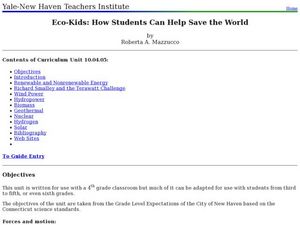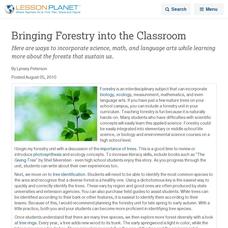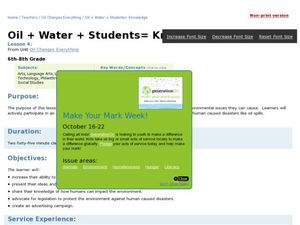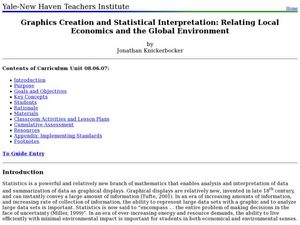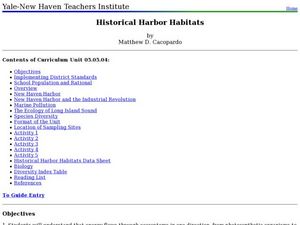Curated OER
Exploring Ecology
Students explore the basics of ecology. They discuss ecological succession, the water cycle and human impacts on the environment. Students explore the owls, succession, the human impact on the environment and complete the "Incredible...
Curated OER
The Hazardous Waste Dilemma
Students discuss the characteristics of a hazardous waste site and how they can cause health problems to humans. In groups, they research the various ways to deal with the hazardous materials and read recent articles on the subject. To...
Curated OER
Spatial Characterization of Animal Movement
Students identify biotic and abiotic factors which may alter the observed patterns in plant communities with different structural characteristics, climate, or environmental constraints.
Curated OER
Making a Human Tree
Learners explore botany by defining the anatomy of a tree. In this environmental exploration lesson plan, students research plant vocabulary terms and discuss the uses of each word. Learners create a "human" tree by role-playing as one...
Curated OER
Eco-Kids: How Students Can Help Save the World
Fourth graders identify the different types of renewable and nonrenewable energy sources. In this ecology lesson, 4th graders create models of wind mills and hydropower. They discuss the pros and cons of using alternative forms of energy.
Curated OER
Organic and Inorganic Recycling
Students examine their role in polluting the environment and discuss the importance of recycling. In groups, they place earthworms into compost piles to observe why they are considered natural recyclers. They also practice sorting a...
Curated OER
Fueling Around with Energy: A Comparative Study of Conventional and Renewable Energy Use Among Nations
Ninth graders examine the relationship between energy and society. In groups, they define energy sources as renewable or conventional and research how each method contributes to the world's energy. They write about how the patterns of...
Curated OER
Fueling Around with Energy: A Comparative Study of Conventional and Renewable Energy Use Among Nations
Students compare and contrast renewable and conventional energy sources. In this energy lesson, students research about conventional fuel and present a persuasive argument about their stand on the issue.
Curated OER
Bringing Forestry into the Classroom
Here are ways to incorporate science, math, and language arts while learning more about the forests that sustain us.
Curated OER
Biosphere II
Students continue their examination of the existence of life on Earth. In groups, they determine the role of the water cycle and other biogeochemical cycles play in keeping balance on Earth. They participate in experiments to discover...
Curated OER
Oil + Water + Students= Knowledge
Students create advertising with the intent of protecting wildlife. In this service learning instructional activity, students craft advertisements and write persuasive essays regarding the protection of wildlife.
Curated OER
Out on a Limb: Earth Day
Students understand the importance of trees to the environment and their community. In this Earth Day instructional activity, students discuss the value of trees and plan a project to plant trees. Students understand the role of an...
Curated OER
Graphics Creation and Statistical Interpretation: Relating Local Economics and the Global Environment
Learners apply statistics, and graphical interpretation to economics, the environment and populations. In this statistical activity students construct graphical displays and classify data.
Curated OER
From Farm to Table
It's important for students to understand where our food comes from and the environmental implications of agriculture.
Curated OER
Great Lakes Ecology
Students are able to use a secchi disk to measure the turbidity of water by determining the depth at which the sechi disk is no longer visible and using the data in a formula to quantify the results. They are able to use Vernier probes...
Curated OER
Control of the Cell Cycle
In this cell cycle learning exercise, students review how enzymes control the cell cycle and what happens when the cell cycle becomes uncontrolled. This learning exercise has 7 short answer questions.
Curated OER
Attributes of Renewable Energy: From Nanopossibilities to Solar Power
Students explore solar energy, why we use it and how we use it. In this renewable energy lesson students compare active and solar techniques.
Curated OER
Jane Goodall, Renowned Naturalist and Champion of Chimpanzees
Students study the life of Jane Goodall and how she made an impact studying chimpanzees. In this endangered species instructional activity students write in their journals.
Curated OER
Population Biology
In this population worksheet, students will determine if 12 statements about demographic trends, including the effects of birth and death rates on populations, are true or not. Then students will match 6 population growth vocabulary...
Curated OER
Making Waves: A Study of Earthquakes and Tsunami
Learners examine plate tectonics and the causative effect of earthquakes. In this tectonics lesson students differentiate between the types of energy waves that cause earthquakes and tsunamis and how waves travel at different...
Curated OER
Nutrition: It's In Your Hands
Fourth graders use this lesson to focus on their health, nutrition and the state of the environment. In groups, they examine the various types of land, water and air pollutants and compare and contrast a food chain with and without a...
Curated OER
Earth Day for a Small World
Students explore what it means to be a good steward of the environment. In this Earth Day instructional activity, students create watercolor pictures of how to take care of the earth. They brainstorm ideas for an Earth Day project.
Curated OER
Lights Light Up My Life
Students conduct an investigation. In this energy conservation lesson, students observe and make predictions about fluorescent and incandescent light bulbs. Working in groups, students conduct an investigation to compare the two light...
Curated OER
Historical Harbor Habitats
Tenth graders create food web displays in the classroom. In this ecology lesson, 10th graders identify the different pollutants in the environment and their effect on organisms. They collect samples of sediments from the harbor and...






